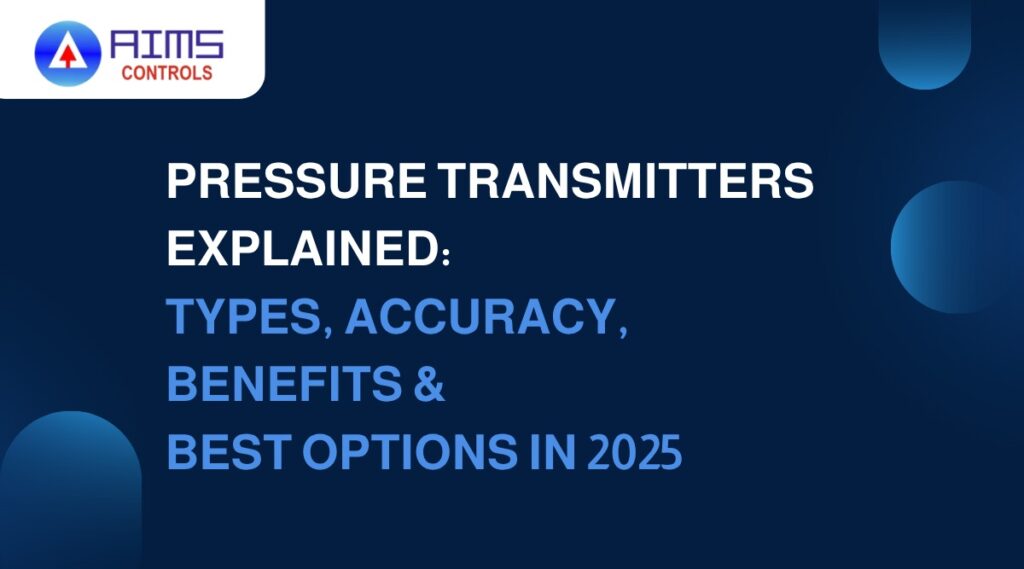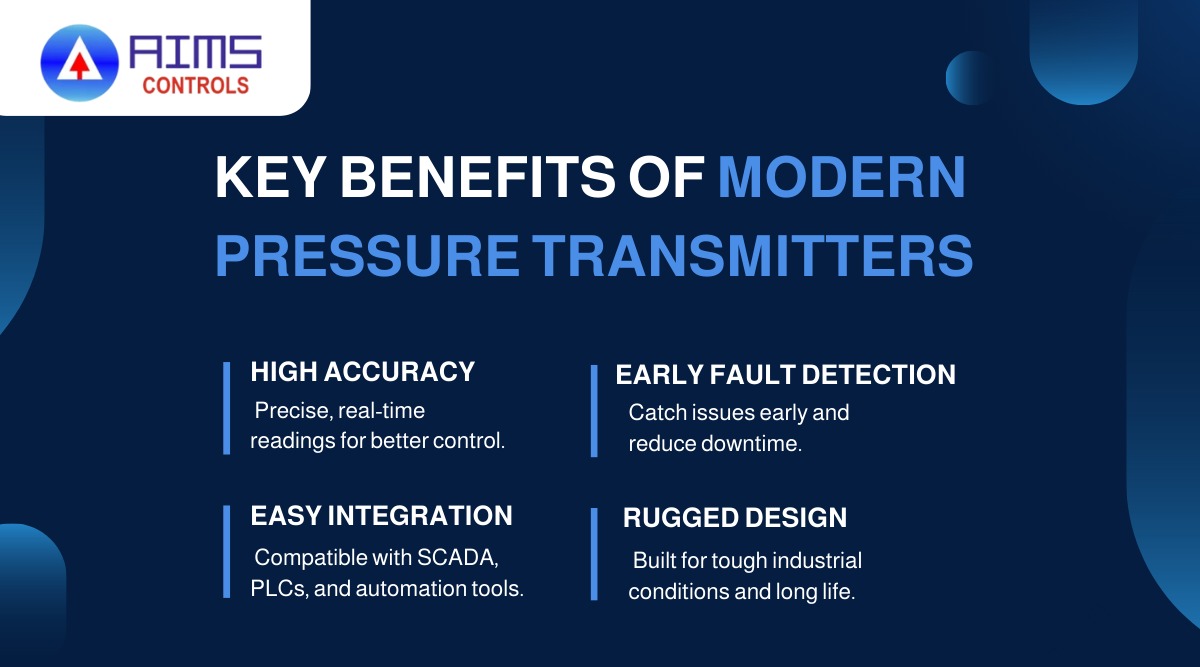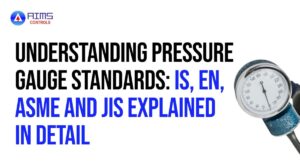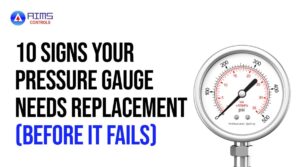In modern industrial environments, precision and control are non-negotiable. Whether you’re managing critical chemical processes, maintaining safe fluid flow, or optimizing automation in a manufacturing plant, pressure transmitters play an indispensable role. These devices convert pressure into an electrical signal that can be measured, monitored, and used to make real-time decisions across a variety of systems.
From ensuring operational safety to improving energy efficiency, the right pressure transmitter can be the difference between seamless performance and costly downtime. In this guide, we break down what pressure transmitters are, the different types available, and how to choose the right one for your specific needs. We’ll also highlight industry-trusted options from AIMS Controls, a leading manufacturer of industrial instrumentation solutions in Gujarat, India.
What is a Pressure Transmitter?
A pressure transmitter is an instrument that senses pressure in a gas or liquid and converts it into an electrical signal. This output is sent to control systems for monitoring and automation. It ensures processes operate safely and efficiently by providing real-time pressure data.
These devices are used in industries like oil & gas, chemical processing, water treatment, pharmaceuticals, and food manufacturing. Pressure transmitters help maintain consistent output, prevent system failures, and support quality control. They are a vital part of industrial process instrumentation.
Types of Pressure Transmitters
1. Absolute Pressure Transmitters
Absolute pressure transmitters measure pressure relative to a perfect vacuum, not atmospheric pressure. This makes them ideal for applications requiring consistent precision regardless of ambient conditions. These transmitters are sealed and calibrated to maintain long-term accuracy.
They are crucial in processes where even minor pressure deviations can compromise outcomes. Their reliability ensures operational safety and efficiency. Such systems are commonly used in high-precision environments.
Use Cases:
- Vacuum chambers
- Semiconductor manufacturing
- Pharmaceutical vacuum packaging
- Aerospace altitude simulation
2. Gauge Pressure Transmitters
Gauge pressure transmitters measure pressure relative to the current atmospheric pressure. This means the output reflects the difference between the process pressure and ambient pressure. These are among the most commonly used pressure transmitters across various industries.
They are especially suitable for systems where pressure monitoring is influenced by environmental changes. Their robust design and ease of integration make them ideal for general industrial use.
Use Cases:
- HVAC systems
- Pipeline pressure monitoring
- Hydraulic and pneumatic systems
- Water treatment plants
3. Differential Pressure Transmitters
Differential pressure transmitters calculate the difference between two pressure points in a process. This differential value is crucial for determining flow rates, fluid levels, or monitoring system restrictions. These transmitters are known for their versatility and reliability in dynamic environments.
They are widely used in applications requiring precise control and measurement, especially where pressure gradients are essential to system performance.
Use Cases:
- Flow measurement in pipes and ducts
- Monitoring filters for blockages or clogs
- Level measurement in pressurized tanks
- Boiler and condenser performance tracking
Differential Pressure Transmitter by AIMS Controls – Built for high-accuracy, industrial-grade reliability.
4. Level and Flow Transmitters
Level and flow transmitters are engineered to accurately monitor liquid levels and flow rates in closed or open systems. These devices play a vital role in industrial automation, ensuring safety, precision, and operational efficiency. They often use differential pressure principles combined with remote or capillary seals for high-temperature or corrosive environments.
This category includes advanced designs like direct flanged and capillary types for versatile installation.
Use Cases:
- Tank level monitoring in chemical and pharma plants
- Flow measurement in water treatment facilities
- Storage vessel pressure level control
- High-temperature or corrosive fluid applications
Capillary Direct Flanged Type DP Level Flow Transmitter – Ideal for harsh conditions and precision monitoring.
5. Smart Pressure Transmitters
Smart pressure transmitters are modern, intelligent devices that not only measure pressure but also offer advanced features like digital communication, self-diagnostics, and remote calibration. These transmitters enhance system efficiency and reduce downtime by integrating seamlessly with control systems and PLCs.
They are ideal for industries where data accuracy and real-time monitoring are crucial.
Use Cases:
- Advanced automation and SCADA systems
- Pharma manufacturing requires audit trails
- Oil & gas plants needing predictive diagnostics
- Any process industry requiring digital feedback loops
Smart Absolute/Gauge Pressure Transmitter – A top performer offering precision and digital intelligence.
Key Benefits of Using Modern Pressure Transmitters
- High Accuracy – Delivers precise, real-time pressure readings for better process control.
- Early Fault Detection – Identifies abnormalities early, minimizing unplanned downtime and maintenance costs.
- Easy Integration – Works seamlessly with SCADA, PLCs, and other automation systems.
- Rugged Design – Built to withstand harsh conditions, ensuring long operational life in industrial environments.
Applications Across Industries
Oil & Gas
Pressure transmitters play a vital role in monitoring wellhead pressure, managing pipeline integrity, and optimizing refinery processes. Accurate data ensures operational safety and efficiency in both upstream and downstream activities.
Water Treatment
These devices help maintain ideal pressure in filtration systems, monitor booster pumps, and manage storage tanks. Their reliability ensures consistent water quality and reduces energy consumption.
Pharmaceuticals
In sterile and highly regulated environments, pressure transmitters ensure compliance by monitoring autoclaves, bioreactors, and fluid transfer processes. Precision is key to avoiding contamination and maintaining product consistency.
Food & Beverage
From carbonation to pasteurization, pressure transmitters help control critical processes. They are often used in CIP (Clean-in-Place) systems and ensure hygiene standards are met without compromising productivity.
Manufacturing & Industrial Automation
Used in hydraulic presses, pneumatic controls, and assembly lines, pressure transmitters enhance equipment longevity, reduce downtime, and enable predictive maintenance through real-time monitoring.
How to Choose the Right Pressure Transmitter
Selecting the right pressure transmitter depends on several key factors. Understanding your application’s requirements is essential to ensure optimal performance and longevity.
- Type of Pressure Measurement: Determine whether you need absolute, gauge, or differential pressure monitoring. For example, use differential transmitters for flow systems and gauge transmitters for hydraulic pressure.
- Operating Environment: Consider exposure to high temperatures, moisture, or corrosive substances. Harsh environments require rugged, well-sealed devices.
- Required Accuracy: Some processes—especially in pharma or high-end automation—demand ultra-precise measurement and diagnostics.
- Integration Needs: Ensure compatibility with existing PLCs, SCADA, or digital communication systems.
Choosing the right model can be complex. That’s why consulting with specialists like AIMS Controls ensures you get a pressure transmitter tailored to your operational and industry-specific needs.
Why Choose AIMS Controls’ Pressure Transmitters
AIMS Controls has earned the trust of industry leaders across India and beyond by delivering performance-focused instrumentation for over a decade. Each pressure transmitter is designed to perform reliably in real-world industrial conditions—whether that’s extreme temperatures, corrosive environments, or remote operations.
- Trusted by leading sectors including oil & gas, water treatment, and manufacturing
- Engineered for Indian operational environments, built to meet global benchmarks
- Backed by expert consultation and technical support
Conclusion: Precise Monitoring Starts with the Right Transmitter
In today’s precision-driven industries, choosing the right pressure transmitter can make all the difference in safety, efficiency, and cost savings. Whether you’re managing flow, level, or pressure, AIMS Controls, based in Gujarat, India, offers field-tested, dependable solutions tailored to your needs.
Explore AIMS Controls’ full range of transmitters today and speak to our specialists about your custom application.











